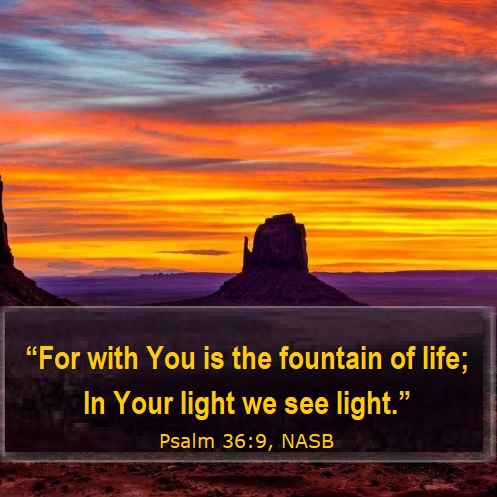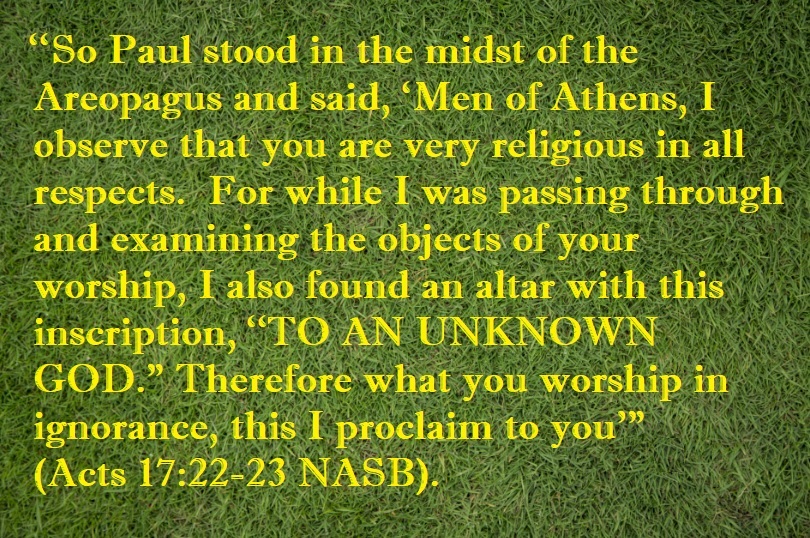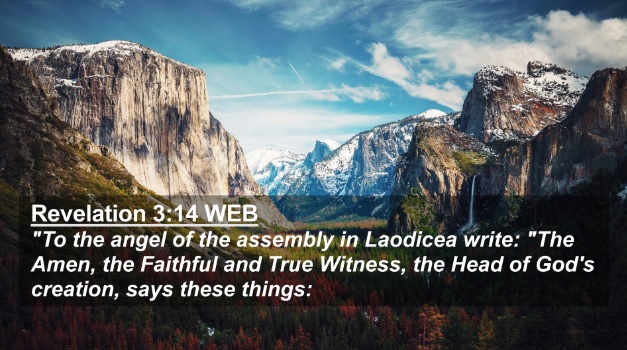“Go therefore and make disciples of all the nations…teaching them to observe all that I commanded you; and lo, I am with you always, even to the end of the age” (Matthew 28:19-20, NASB).
——————–
Contents
1) Jesus the Living Water (Doy Moyer)
2) Finding Common Ground (Joel Raulerson)
——————–

-1-
Jesus the Living Water
Doy Moyer
Jesus came into Samaria to a town called Sychar, where Jacob’s well was situated between mounts Ebal and Gerazim. Here a Samaritan woman came to draw water, and Jesus simply said, “Give me a drink.” The woman was taken aback because Jews and Samaritans had no dealings with each other, but this did not stop Jesus. He said to her, “If you knew the gift of God, and who it is that is saying to you, ‘Give me a drink,’ you would have asked him, and he would have given you living water” (John 4:10). While she was puzzled about how Jesus could draw water at this well, He said to her, “Everyone who drinks of this water will be thirsty again, but whoever drinks of the water that I will give him will never be thirsty again. The water that I will give him will become in him a spring of water welling up to eternal life” (John 4:13-14). She wanted this water, and the conversation that ensued convinced her that Jesus was indeed the Prophet from God.
This theme of water is significant in Scripture. In John’s gospel, John the immerser baptized with water to identify the Messiah (John 1:19-34). Jesus turned water into wine (John 2). He then told Nicodemus that “unless one is born of water and the Spirit, he cannot enter the kingdom of God” (John 3:5). On the last day of the feast of booths, Jesus cried out, “If anyone thirsts, let him come to me and drink. Whoever believes in me, as the Scripture has said, ‘Out of his heart will flow rivers of living water’” (John 7:37-38). By the end of John’s account, when Jesus was pierced in the heart, “at once there came out blood and water” (John 19:34). Other references can be given, but these should suffice to show that water is an important theme.
Much can be said for each reference, but the brief focus here is on Jesus providing living water. In the Old Testament, living water (i.e., fresh or running water) was to be used to cleanse lepers and other defilements (Leviticus 14:5-6; 15:13; Numbers 19:17). Yet the living water provided in such contexts was limited to the time and place of its use. In John 4, the well was an important source of water, but it was still going to be limited. The water Jesus was offering is different. While the physical water was necessary to live, the water from Jesus leads to an even greater life, to eternal life. Koester offers these thoughts:
“The water in Jacob’s well was bound to a place; it needed to be hauled out by hand and it only quenched thirst for a short time. But the water Jesus promised was not bound to one place; it would spring up within a person so that he or she would never thirst again. The water from Jacob’s well could extend life for a while, but living water from Jesus would issue into life everlasting, which in John’s Gospel refers to life lived in relationship with God” [Craig Koester, Symbolism in the Fourth Gospel: Meaning, Mystery, Community, 189].
When God gave Israel water in the wilderness, the people sang, “Spring up, O well! Sing to it!” (Numbers 21:17). God provided for them the gift of water so that they could live. God cared for them, led them by the Holy Spirit, revealed His word, and gave them every opportunity to live with Him. Sadly, they ended up rejecting Him, as Jeremiah noted,
“For My people have committed two evils:
They have forsaken Me,
The fountain of living waters,
To hew for themselves cisterns,
Broken cisterns
That can hold no water” (Jeremiah 2:13; cf. 17:13).
God was not done, though. His plan through the Messiah was to open up a fountain “for sin and for impurity” (Zechariah 13:1). In Jesus is fulfilled the psalmist’s thoughts: “For with You is the fountain of life; In Your light we see light” (Psalms 36:9). His teaching is a “fountain of life,” as is the wisdom that pours forth from Him (Proverbs 13:14; cf Proverbs 18:4).
Drinking from the living water offered by Jesus means that we are partaking in His teaching and the Spirit. Again, He said, “If anyone is thirsty, let him come to Me and drink. He who believes in Me, as the Scripture said, ‘From his innermost being will flow rivers of living water.’ But this He spoke of the Spirit, whom those who believed in Him were to receive …” (John 7:37-39). By committing to the living water, we are committing to God’s Son, His word, and living by His Holy Spirit, for “if the Spirit of Him who raised Jesus from the dead dwells in you, He who raised Christ Jesus from the dead will also give life to your mortal bodies through His Spirit who dwells in you” (Romans 8:11).
Jesus offers us Himself, the true Living Water from heaven who will cleanse us from our sins and give us eternal life. “There’s a fountain free, ’tis for you and me…”
— Via Articles from the La Vista church of Christ, January 27, 2014
——————–

-2-
Finding Common Ground
Joel Raulerson
After His resurrection, Jesus instructed His apostles, saying, “Go therefore and make disciples of all the nations, baptizing them in the name of the Father and of the Son and of the Holy Spirit, teaching them to observe all things that I have commanded you; and lo, I am with you always, even to the end of the age” (Matt. 28:19-20). The gospel of Christ must be taken to the world so that souls can be saved. Sinners must hear, believe, and obey the gospel to be forgiven of sins and be saved (cf. Mk. 16:15-16; Acts 2:36-41; Rom. 6:3-4, 17-18; 10:9-10). To effectively teach the lost, we need to find common ground on which to build. The people we seek to teach will come from different religious backgrounds, have different levels of understanding as far as what the Bible teaches, and will be at different stages in their thinking about the Lord. They all need the gospel, but not all are prepared to start at the same place. How will we reach them with the good news?
Let us consider the following three examples of the apostle Paul’s work in the book of Acts. Note his emphasis on finding common ground to begin teaching.
Worshippers at the Synagogue. Upon arriving at the Jewish synagogue in Thessalonica, the Bible says, “Then Paul, as his custom was, went in to them, and for three Sabbaths reasoned with them from the Scriptures, explaining and demonstrating that the Christ had to suffer and rise again from the dead, and saying, ‘This Jesus whom I preach to you is the Christ’” (Acts 17:2-3). The common ground between Paul and those at the synagogue was a shared belief in the Old Testament Scriptures. Since this was the case, the apostle could simply appeal to the Scriptures to show that Jesus fulfilled that which was written in the prophets. While the worshippers at the synagogue didn’t understand God’s new law completely, Paul started at their level of understanding and built upon that foundation.
The Pagan Philosophers. Where the previous group had a religious background to build upon, the pagans further in Acts 17 were an amalgamation of idolaters, spending their days debating the validity of gods. Paul took that common ground and built upon it using the altar to the “Unknown God” that he had seen in Athens. Paul began to speak to the pagan philosophers, saying, “God, who made the world and everything in it, since He is Lord of heaven and earth, does not dwell in temples made with hands. Nor is He worshiped with men’s hands, as though He needed anything, since He gives to all life, breath, and all things” (Acts 17:24-25). Since these men did not believe the Old Testament Scriptures, he could not start with them at the same place he started in Thessalonica. Instead, Paul looked for common ground in the concept of an absolute Creator who made men, who is to be worshiped by men, and who will eventually judge men (vv. 30-31).
The Roman Governor. When Paul was presented with the opportunity to preach Christ to Felix, the Bible says, “Now as he reasoned about righteousness, self-control, and the judgment to come, Felix was afraid and answered, ‘Go away for now; when I have a convenient time I will call for you’” (Acts 24:25). Again, we have a very different background compared to the previous two examples, but that did not stop Paul from being able to find common ground. The governor was living an immoral lifestyle. In order to establish a common foundation in his efforts to teach Felix, Paul pointed out that God has issued a standard, man is expected to live in harmony with that standard, and man will be held accountable by God for transgressing His standard. Paul was no stranger to sin, even calling himself the chief of sinners (1 Tim. 1:15). Paul was able to take the common foundation of living in sin and relating to Felix to prick his heart with God’s word.
Conclusion. Paul effectively spread the gospel in all three examples cited above, even though he needed to find a different foundation from which to build in each case. As we seek today to reach people of differing beliefs, various backgrounds, and diverse lifestyles, we will need to work to find common ground upon which to build to help them to understand and obey the gospel. May we never be ashamed of the gospel and continually seek out the most effective way to lead others to salvation (Rom. 1:16)!
— Via Articles from the Knollwood church of Christ, October 2023
——————–
The Steps That Lead to Eternal Salvation
1) Hear the gospel — for that is how faith comes (Rom. 10:17; John 20:30-31).
2) Believe in the deity of Jesus Christ, the Son of God (John 8:24; John 3:18).
3) Repent of sins. For every accountable person has sinned (Romans 3:23; Romans 3:10), which causes one to be spiritually dead (Ephesians 2:1) and separated from God (Isaiah 59:1-2; Romans 6:23). Therefore, repentance of sin is necessary (Luke 13:5; Acts 17:30). For whether the sin seems great or small, there will still be the same penalty for either (Matt. 12:36-37; 2 Cor. 5:10) — and even for a lie (Rev. 21:8).
4) Confess faith in Christ (Rom. 10:9-10; Acts 8:36-38).
5) Be baptized in water for the remission of sins (Mark 16:16; Acts 2:38; 22:16; 1 Pet. 3:21). This is the final step that puts one into Christ (Gal. 3:26-27). For from that baptism, one is then raised as a new creature (2 Cor. 5:17), having all sins forgiven and beginning a new life as a Christian (Rom. 6:3-4). For the one being baptized does so “through faith in the working of God” (Col. 2:12). In other words, believing that God will keep His word and forgive after one submits to these necessary steps. And now as a Christian, we then need to…
6) Continue in the faith by living for the Lord; for, if not, salvation can be lost (Matt. 24:13; Heb. 10:36-39; Rev. 2:10; 2 Pet. 2:20-22).
——————–
Tebeau Street
CHURCH OF CHRIST
1402 Tebeau Street, Waycross, GA 31501
Sunday: 9 a.m. Bible Classes and 10 a.m. Worship Service. Congregational Song Service: 5 p.m. for every first Sunday of the month.
Wednesday: 7 p.m. Bible Classes
evangelist/editor: Tom Edwards (912) 281-9917
Tom@ThomasTEdwards.com
https://thomastedwards.com/go/all.htm (This is a link to the older version of the Gospel Observer website, but with bulletins going back to March 4, 1990.)





